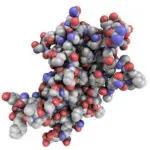Blog
Traditional HGH vs. Peptides: Which Is Better? A Complete Breakdown

Cosmetic and performance enhancement therapies have become quite popular in recent years, stimulating debates among health enthusiasts about traditional HGH vs. peptides. Which one is better?
Human growth hormone (HGH) injections are a longtime favorite with those seeking youthful energy and improved body composition. But, there’s a new kid on the block: peptide therapy, which promotes the body’s natural production of growth hormone.
As you age, your natural production of HGH declines. This can lead to reduced muscle tone, slower recovery, and visible signs of aging.
While synthetic HGH injections offer a quick boost in hormone levels, they can come with legal restrictions and potential side effects. Peptide therapy gently stimulates your body’s own production of HGH.
So, which is better: HGH peptides or HGH? This blog will explore their various benefits and drawbacks to help you decide which best suits your goals and lifestyle.
What are HGH peptides?
HGH peptides are short chains of amino acids that stimulate the pituitary gland to release more growth hormone naturally.
Unlike synthetic HGH injections, which introduce the hormone directly into the body, peptides for HGH production work with your natural biology. Common HGH-stimulating peptides include Tesamorelin, CJC-1295, and Ipamorelin.
These peptides offer a safer, more natural option to hormone optimization. They work with your body’s natural processes and are an accessible alternative to traditional hormone therapy.
CJC-1295
CJC-1295 is a synthetic version of growth-hormone-releasing hormone (GHRH). Once released in the body, it attaches to the pituitary gland receptors.
This action activates a surge in growth hormone release. The effects continue for a few days because of the peptide’s long half-life.
It encourages a continuous increase in growth hormone and IGF-1 levels. The result is a deeper and more restorative sleep. It also improves metabolism, supporting fat loss and lean muscle growth.
Ipamorelin
Ipamorelin mimics the hormone ghrelin, telling the pituitary gland to release growth hormone naturally without really affecting your appetite.
It benefits those who want better sleep, improved muscle recovery, and weight loss perks.
Ipamorelin delivers effects with less risk of affecting hormonal balances.
Tesamorelin
Tesamorelin is a clinically approved peptide known for reducing visceral fat. It mimics GHRH, stimulating the pituitary gland to produce more natural growth hormone.
Apart from fat loss, Tesamorelin may boost IGF-1 levels, support muscle definition, increase energy, and enhance metabolic function.
What is traditional HGH?
Traditional HGH therapy uses recombinant human growth hormone (rhGH) to replace the body’s declining natural production. Introduced in the 1980s, this synthetic form replaced earlier, less safe methods that involved extracting HGH from human cadavers.
Scientists use recombinant DNA technology to produce rhGH by inserting the human growth hormone gene into E. coli bacteria. This process creates a pure, consistent hormone that is usually administered via subcutaneous injection.
Medical use
Traditional HGH therapy may improve muscle mass, bone density, body composition, and quality of life.
Medical practitioners mainly prescribe rhGH to people with growth hormone deficiency. They also recommend it for Turner syndrome and Prader-Willi syndrome. It could also benefit people with chronic kidney disease and muscle wasting because of HIV/AIDS.
It’s usually administered via subcutaneous injection and is available only by prescription. While effective, it can cost thousands to tens of thousands of dollars annually.
Risks and side effects
When comparing HGH vs. peptides, traditional HGH may have minor side effects and risks. It may cause fluid retention in certain individuals. The effects may lead to joint pain and changes in glucose tolerance.
Using higher doses or off-label products may increase the risk. It could lead to serious conditions like fluid retention (edema) and gynecomastia. It also slightly elevates the possibility of cancer with prolonged high doses.
Administering doses higher than natural levels may increase the risk of mortality. Experts have linked this possibility to critically ill patients. Strict regulations govern HGH usage, and it is only legally available with a prescription.
Key contrast
What’s the main difference between HGH vs. peptides? HGH therapy delivers the synthetic hormone into the bloodstream, while peptides stimulate the pituitary gland to produce HGH naturally.
MK-677 is an active growth hormone secretagogue that boosts natural secretion of GH and IGF-1. It functions without disrupting the body’s rhythms. Also known as Ibutamoren, it’s an orally administered compound without major side effects.
Main differences: Effectiveness, safety, and cost
The comparison between HGH peptides and HGH highlights clear distinctions, including their effectiveness, safety, and accessibility.
Muscle growth and fat loss
HGH injections can deliver fast gains in muscle mass and fat reduction. However, this often means taking supraphysiological doses, which may increase the risk of side effects like joint swelling and insulin resistance.
Peptides for HGH production support similar goals, but more gradually and safely. They promote steady fat metabolism and lean muscle development without overwhelming your body’s hormonal systems.
Sleep and recovery
HGH peptides like CJC-1295 and Ipamorelin help improve deep sleep cycles by supporting natural hormone rhythms.
Better sleep leads to improved recovery times, better cognitive function, and a boost in overall performance, essential benefits for athletes and aging adults.
Safety, accessibility, and cost
When comparing the safety of HGH peptides vs. HGH, the former has a significant advantage because of their indirect mechanism of action.
Peptides also have fewer and more subdued side effects. They also have a super low risk of overdose and work harmoniously with your body’s endocrine feedback loops.
Synthetic HGH is strictly regulated and only available via prescription. Peptides are more accessible, and you can readily get them from many wellness clinics.
Another key difference is the cost difference. Peptide therapy is more affordable than traditional HGH injections. Its cost makes it a more practical option for long-term use.
Here’s an overview of the differences between HGH peptides and HGH:
| HGH Peptides | Traditional HGH | |
| Examples | CJC-1295, Ipamorelin, Tesamorelin | Recombinant HGH (somatropin) |
| Process | Stimulates natural HGH release via the pituitary gland | Direct hormone replacement |
| Mechanism | Mimics body’s natural pulsatile release | Floods bloodstream with HGH |
| Benefits | Gradual improvements in fat loss, muscle tone | Faster muscle growth and fat reduction |
| Side effects | Mild and rare when dosed properly | Higher risk with misuse or high doses |
| Cost | More affordable | Expensive |
| Legal availability | Often available through wellness clinics | Prescription only |
LIVV Lean & Mean is a powerful peptide blend designed to optimize body composition by boosting growth hormone naturally. Featuring CJC-1295, Ipamorelin, BPC-157, and Tesamorelin, this protocol supports lean muscle growth, fat burning, and metabolic health.
Tesamorelin targets visceral fat while enhancing IGF-1 for muscle maintenance. Ipamorelin promotes GH release without spiking hunger or stress hormones, while BPC-157 is for recovery and inflammation control.
Best HGH peptides for hair growth and anti-aging
Are you looking for the best HGH peptides for hair growth and anti-aging?
Peptides like Tesamorelin and CJC-1295 support collagen synthesis, enhance skin elasticity, and improve scalp circulation, all of which contribute to thicker, healthier hair and fewer wrinkles.
The combo of Tesamorelin and CJC-1295 helps boost IGF-1 levels while supporting the body’s natural repair processes. It delivers visible improvements in skin texture and hair density while minimizing the risks associated with high-dose hormone therapy.
Research links low growth hormone levels and elevated DHT to hair loss. These peptides help rebalance hormones, potentially reducing DHT’s impact and supporting long-term hair retention.
With added benefits like better sleep and faster cellular repair, peptide therapy is a safer, more sustainable path to vibrant skin and stronger hair. It’s a smart alternative to synthetic HGH for anti-aging support.
HGH peptides vs. HGH: Which is right for you?
Choosing between HGH vs. peptides is a pivotal decision for those seeking anti-aging solutions, muscle enhancement, and improved hormone levels.
Both peptides and traditional HGH seek to increase hormone levels, but their mechanisms vary. They also differ in safety profiles and practical considerations.
Traditional HGH
This treatment delivers synthetic HGH directly into the bloodstream, resulting in a rapid and significant increase in hormone levels.
It can speed up muscle growth, fat loss, and recovery, but it bypasses the body’s natural endocrine regulation, which may increase the risk of side effects like insulin resistance, fluid retention, and joint pain.
Traditional HGH therapy is strictly regulated because of its potency and potential risks. It’s available only by prescription and often comes with high costs. Ongoing medical supervision and regular dose adjustments are typically required.
HGH peptides
Peptides for HGH production work by stimulating the pituitary gland to release growth hormone naturally in a controlled, rhythmic manner.
This supports balanced hormone levels and reduces the risk of side effects often associated with synthetic hormone therapies.
Because they work in harmony with the body’s endocrine system, peptides are considered safer for long-term use. They’re also more accessible, with fewer regulatory restrictions compared to traditional HGH.
Peptide therapy is generally more affordable and easier to incorporate into a sustainable wellness routine.
Which one should you choose?
Here’s a short breakdown:
- Traditional HGH: May be appropriate for those with diagnosed growth hormone deficiency, under medical supervision.
- HGH peptides: Better suited for people seeking anti-aging, fat loss, or muscle enhancement without the risks of hormone overload.
Irrespective of which option you may choose, make sure to consult a knowledgeable medical professional beforehand. They can evaluate your hormone levels and health status. This assessment helps them recommend a safe and effective approach.
FAQs about traditional HGH vs. peptides
Below are some answers to commonly asked questions about HGH vs. peptides.
What are HGH peptides used for?
Most people use HGH peptides to stimulate the body’s natural production of growth hormone for fat loss, muscle gain, better sleep, and recovery.
Are peptides safer than HGH?
Yes, peptides are considered safer than HGH because they work within the body’s hormonal feedback loop, reducing the risk of overdose and side effects.
Do HGH peptides really work?
Yes, clinical studies and real-world results support the effectiveness of HGH peptides like CJC-1295, Ipamorelin, and Tesamorelin.
What are the best HGH peptides for hair growth?
The best HGH peptides for hair growth include Tesamorelin and CJC-1295. They promote collagen production, which supports hair follicle health and regrowth.
A natural path to growth hormone optimization
Still unsure whether HGH peptides or synthetic HGH is the better choice?
HGH peptides are a natural and safe approach. Unlike traditional HGH injections, they work in harmony with your body. The physiological process minimizes the side effects and also reduces the risks of overdose.
Peptides are a viable alternative in supporting anti-aging, muscle growth, and fat loss. They’re also a practical choice since they’re more accessible and affordable.
Peptides for HGH production provide a holistic path to improved body composition and also encourage radiant skin and hair.
Ready to boost your growth hormone levels naturally? At LIVV Natural, we offer physician-grade peptide therapies tailored to your goals. Schedule a consultation today and discover the safest, most effective way to optimize your health.


